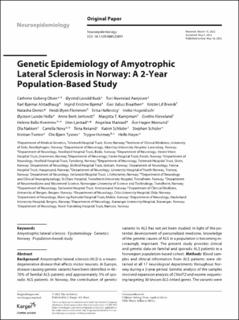Genetic epidemiology of amyotrophic lateral sclerosis in Norway - a 2-year population based study
Olsen, Cathrine Goberg; Busk, Øyvind Løvold; Aanjesen, Tori Navestad; Alstadhaug, Karl Bjørnar; Bjørnå, Ingrid Kristine; Braathen, Geir Julius; Breivik, Kristin Lif; Demic, Natasha; Flemmen, Heidi Øyen; Hallerstig, Erika; HogenEsch, Ineke; Holla, Øystein Lunde; Jøntvedt, Anne Berit; Kampman, Margitta T.; Kleveland, Grethe; Kvernmo, Helene Ballo; Ljøstad, Unn; Maniaol, Angelina; Morsund, Åse Hagen; Nakken, Ola; Novy, Camilla; Rekand, Tiina; Schlüter, Katrin Ruth; Schuler, Stephan; Tveten, Kristian; Tysnes, Ole-Bjørn; Holmøy, Trygve; Høyer, Helle
Peer reviewed, Journal article
Published version

Åpne
Permanent lenke
https://hdl.handle.net/11250/3036405Utgivelsesdato
2022Metadata
Vis full innførselSamlinger
Sammendrag
Background: Amyotrophic lateral sclerosis (ALS) is a neurodegenerative disease that affects motor neurons. In Europe, disease-causing genetic variants have been identified in 40-70% of familial ALS patients and approximately in 5% of sporadic ALS patients. In Norway, the contribution of genetic variants to ALS has not yet been studied. In light of the potential development of personalized medicine, knowledge of genetic causes of ALS in a population is becoming increasingly important. The present study provides clinical and genetic data on familial and sporadic ALS patients in a Norwegian population-based cohort. Methods: Blood samples and clinical information from ALS patients were obtained at all 17 neurological departments throughout Norway during a 2-year period. Genetic analysis of the samples involved expansion analysis of C9orf72 and exome sequencing targeting 30 known ALS-linked genes. The variants were classified using genotype-phenotype correlations and bioinformatics tools. Results: A total of 279 ALS patients were included in the study. Of these, 11.5% had one or several family members affected with ALS, whereas 88.5% had no known family history of ALS. A genetic cause of ALS was identified in 31 individuals (11.1%), among which 18 (58.1%) were familial and 13 (41.9%) were sporadic. The most common genetic cause was the C9orf72 expansion (6.8%), which was identified in 8 familial and 11 sporadic ALS patients. Pathogenic or likely pathogenic variants of SOD1 and TBK1 were identified in 10 familial and 2 sporadic cases. C9orf72 expansions dominated in patients from the Northern and Central regions, whereas SOD1 variants dominated in patients from the South-Eastern region. Conclusion: In the present study, we identified several pathogenic gene variants in both familial and sporadic ALS patients. Restricting genetic analysis to only familial cases would miss more than 40 percent of those with a disease-causing genetic variant, indicating the need for genetic analysis in sporadic cases as well. Genetic epidemiology of amyotrophic lateral sclerosis in Norway - a 2-year population based study
